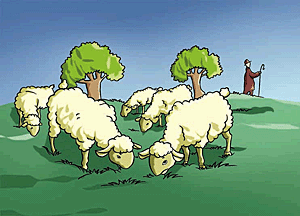phago-, phag-, -phage, -phagi, -phagic, -phagically, -phagia, -phagism, -phagist, -phagic, -phagous, -phagy
(Greek: eat, eating; to consume, to ingest; relationship to eating or consumption by ingestion or engulfing)
phycophagic
A reference to the eating of seaweed or algae.
phyllophagan
A reference to a group of mammals containing the sloths which thrive primarily on leaves.
phyllophagous, phayllophage, phyllophagy
1. To feed on leaves.
2. A reference to plants that obtain nourishment from their leaves.
2. A reference to plants that obtain nourishment from their leaves.
phytophagous, phytophage, phytophagy
Feeding on plants or on plant material.

These sheep are prime examples of phytophagy.

pleophagous, pleophage, pleophagy
1. Feeding on a variety of food substances or food species.
2. A reference to a parasite associated with a variety of hosts or several different hosts.
2. A reference to a parasite associated with a variety of hosts or several different hosts.
pneumophagia
The same as aerophagia; excessive swallowing (breathing in) of air, usually an unconscious process associated with anxiety, resulting in abdominal distention or belching, often interpreted by the patient as signs of a physical disorder, etc.
pollakiphagia, pollaciphagia
An abnormal frequency in eating.
pollenophagous
Refers to feeders on pollen produced by plant stamens.
Certain pollenophagous insects cause more severe damage by clearing a path to the stamens than by collecting pollen. Pollen constitutes an important food resource for numerous beneficial insects.
pollenophagous, pollenophage, pollenophagy
Feeding on pollen.
poltophagy
1. Ingesting porridge [an alteration of pottage; that is, cereal; such as, oatmeal, boiled until thick and usually eaten with milk] or pottage [a thick vegetable, or meat and vegetable soup or stew].
2. Thorough chewing of food.
2. Thorough chewing of food.
polyphage
1. Excessive eating; gluttony; bulimia.
2. The habit on the part of certain animals of feeding on many different types of food.
2. The habit on the part of certain animals of feeding on many different types of food.
polyphagist
Anyone who has an excessive appetite or who eats too much.
polyphagy
1. Eating many kinds of food or consuming a great variety of foods.
2. Excessive, compulsive, or a continuous desire to eat.
2. Excessive, compulsive, or a continuous desire to eat.
1. A condition characterized by changes in the motor function of the alimentary canal as a result of degenerative alterations occurring with advancing age: The elderly Mrs. Park had to eat slowly because she suffered from presbyesophagus and had to chew her food carefully and thoroughly.
2. A disorder in the elderly characterized by altered spontaneous movement of the alimentary tract: Mr. Hathaway, affected with presbyesophagus, had to eat very slowly because swallowing his food was very difficult for him.
2. A disorder in the elderly characterized by altered spontaneous movement of the alimentary tract: Mr. Hathaway, affected with presbyesophagus, had to eat very slowly because swallowing his food was very difficult for him.
A phagocyte that consumes protozoa: The protozoophages are specialized cells in the immune system that ingest and usually destroy foreign particulate matter or microorganisms, like viruses, bacteria, and waste.
Related "eat, eating" word units: brycho-; esculent-; esophago-; glutto-; vor-.
Cross references of word families that are related directly, or indirectly, to: "food, nutrition, nourishment": alimento-; broma-; carno-; cibo-; esculent-; sitio-; tropho-; Eating Crawling Snacks; Eating: Carnivorous-Plant "Pets"; Eating: Folivory or Leaf Eaters; Eating: Omnivorous.


